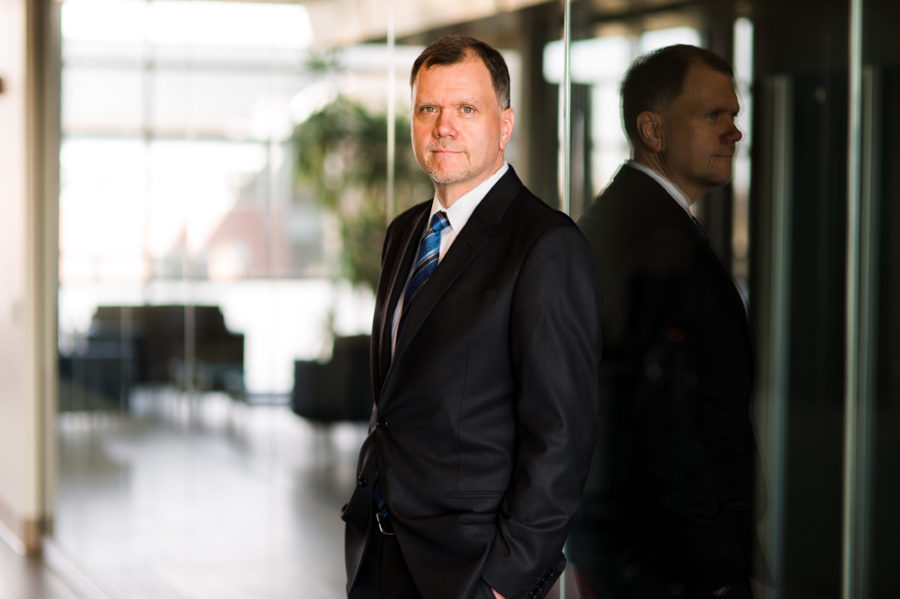Pitt task force planning research restart effort
Courtesy of the University of Pittsburgh
Rob Rutenbar, the senior vice chancellor for research, leads Pitt’s Task Force on Research Restart.
May 14, 2020
More than 100 Pitt faculty and staff are working to restart research at the University as soon as possible, in the midst of the COVID-19 pandemic.
Rob Rutenbar, the senior vice chancellor for research, said at Thursday afternoon’s Senate Council meeting that research is restarting now on a rolling basis after originally shutting down in March. He added that due to the pandemic, labs are now required to place pandemic-specific protective measures in place.
“That means that in many cases, laboratory environments have to be reconfigured to maintain social distancing,” Rutenbar said. “That may mean that schedules have to be modified in order to not have too many people in the room at the same time. They have to show that they’re ready to do that.”
Chaired by Rutenbar, the Research Task Force is made up of seven different working groups — School of Medicine, which focuses on clinical activity, pre-clinical and basic science; Health Sciences; Animal Resources; STEM, which includes large lab facilities and infrastructure; Logistics; Remote Research; and Arts, Humanities, Social Sciences and Libraries, which includes field work, studios, rehearsal and performance spaces. This task force is working on the short-term reopening of research, but also what research in the fall may look like.
Julie Lalo, a spokesperson for Rutenbar, said each working group is focused on defining a path to restart research at the University and develop contingency plans for adjusting to changing circumstances.
“The working groups co-chairs sought out experts in each of these fields, so the members are discussing a wide range of concerns and opportunities to propose guidelines and protocols to resume research,” Lalo said.
At the same time, two other task forces are examining other aspects of the University. One is formulating options on how to run Pitt schools for the upcoming academic year, and the other is drawing up recommendations on how to best support employees and run on-campus operations.
David Vorp, the co-chair of the STEM working group, said his working group first met on April 30 and submitted a draft plan to Rutenbar last week. The group will likely provide Rutenbar with an updated version of the plan Friday, he added.
“Our STEM working group is meeting for at least an hour every day to develop templates to help guide STEM lab [Principal Investigators] to consider as many ways to keep their lab personnel safe when we do get back to doing research,” Vorp, the associate dean for research in the Swanson School of Engineering, said.
There are specific difficulties for the STEM group, especially within the realm of field research.
“We are all concerned with how we will have enough PPE for everyone on campus, not just researchers,” Vorp said. “Many of our researchers donated their lab PPE to the healthcare front-liners at the outset of the pandemic and now are unsure how to replace them.”
Jeremy Berg, the co-chair of the School of Medicine working group, said his committee will also face challenges.
“We are working to have a substantial amount of research by the end of May or early in June,” Berg said. “By the fall, research should be proceeding at close to full swing with appropriate precautions to minimize the chance of SARS-CoV-2 spread.”
Berg said his group, which meets twice per week and exchanges multiple emails everyday, has drafted a document describing principles and guidance for pre-clinical research studies. The document, which is currently under review, stated COVID-19 can be substantially mitigated by social distancing and practicing good hygiene.
“We are also completing an analogous document for clinical research,” Berg said.
The group plans on getting materials to Rutenbar by the end of this week, Berg said. Once the documents are approved by Rutenbar, they will be given to the chancellor for final discussion and approval.
Vorp said the working groups are hopeful that a solution will be found soon, despite the difficulties of planning around a pandemic.
“Each time we come up with a solution to a problem or issue we think of, a short while later we come up with a dozen other scenarios that undermine that solution,” Vorp said. “We are going to have to have some faith, patience and diligence as we go about this, but we have to and we will succeed.”
Community members can submit feedback to the reopening task forces online.



